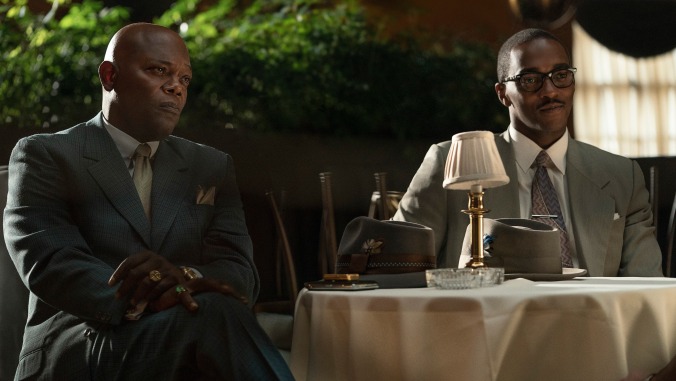This brief father-son scene conveys just about everything the film has to say about Garrett: that he’s a genius but will need to leave Texas if he wants to become successful. In short order, it’s 1954 and we’re in Los Angeles, where he relocates with his wife, Eunice (Nia Long), and plans to get into the real estate business. Given the persistence of stale biopic formulas, the question isn’t so much whether or not he will succeed in the short-term but how (and why) he ends up testifying in Washington over a decade later. It’s perhaps unsurprising that the answer involves at least a few impassioned speeches.
If The Banker sounds like something that should’ve premiered last fall, spurred some Oscar talk, and then promptly been forgotten a week after February 9, that’s because it was originally intended as an awards-season hopeful. One of Apple’s first major film acquisitions, it was slated for the closing night slot of AFI Fest, which would presumably have launched a vigorous awards campaign featuring the phrase “An Apple Original.” Nothing of the sort happened. When sexual assault allegations were brought against Bernard Garrett Jr. (one of the film’s producers) by his half-sister, Cynthia Garrett, both the AFI premiere and Apple’s early-December release plans were promptly nixed. Since then, there’s also been a dispute over the rights to Garrett Sr.’s life story, and criticism of the film’s omission of his second wife, Linda Garrett (Cynthia’s mother), whom he married in 1962, placing her well within The Banker’s overall timeline.
The fraught questions concerning the ownership of Garrett Sr.’s story are ultimately beyond the scope of any single review, while the matter of Linda Garrett’s place in the narrative arguably falls into the more nebulous region of artistic license. In any case, the latter does point to the film’s general lack of curiosity regarding the nuances and personal failings of its ostensible hero (the reasons, say, that Garrett divorced Eunice in 1959). The script, largely based on audiotapes recorded by Garrett in 1995, tracks his rise in the Los Angeles real estate scene, focusing on his relationships with Joe Morris (Samuel L. Jackson), his primary business partner, and Matt Steiner (Nicholas Hoult), a working-class acquaintance whom the pair enlist to front their various business dealings, thus allowing them to circumvent racist banking and loan policies. But over the course of the film’s two-hour runtime, we don’t learn much more about Garrett than we did in its opening minutes. Whereas most biopics tend to psychoanalyze and over-explain their subject’s actions, The Banker maintains a peculiar detachment from Garrett, whom Mackie embodies with a perpetual scowl, conveying steely determination but little more. Likewise, Jackson doesn’t get to do much more than play the wisecracking, jocular foil.
When Garrett comes up with an audacious plan to buy the historical Bankers Building in downtown Los Angeles—the execution of which director George Nolfi (The Adjustment Bureau) gives a recognizable heist-movie flavor—the film’s stock characterizations do prove reasonably entertaining. If Steiner is to successfully negotiate a deal with the city’s business moguls, he needs to both think and act like a born-into-wealth banker, which in this case requires a month of training from each of the principal characters: math lessons from Garrett, golf practice with Morris, and etiquette instruction from Eunice. All told, this is the film’s most briskly entertaining section, even if it does play something like second-rate Soderbergh.
But Nolfi doesn’t do quite so well once The Banker jumps forward to 1963, when Garrett returns to his hometown of Willis, Texas, and convinces Morris and Steiner to help him buy the local Mainland Bank (which he isn’t even allowed to step into as a Black man), allowing them to approve loans for Black families and businesses in need. There’s still some excitement in seeing the trio get one over on their country’s racist system (not to mention the various bigots that prop it up), even as we can guess that their success won’t last, and Garrett moves closer to that dreaded congressional hearing. As Joe remarks, “Even a rigged game’s fun to play.” But one also gets the impression of a story that’s been aggressively sanded down, its rough realities smoothed out into a conventionally rousing narrative. (The persons that Garrett and Morris give out loans to, for instance, are uniformly stock types, abstract figures designed to stoke the viewer’s indignation and nothing else.)
Granted, Garrett’s remarkable story is rousing, rightly spotlighting the discriminatory practices that the Fair Housing Act of 1968 eventually overturned but whose effects are still felt today. When it comes to the larger financial system that Garrett was nonetheless forced to work within, however, The Banker effectively equates the American Dream with “access to capital,” and often streamlines its story to remove any potential ambivalence (if not outright antipathy) toward this belief. Just as it reduces Garrett’s character to a few tenacious traits, the film, in presenting his inspiring story, loses perspective on the broader picture.













![HBO teases new Euphoria, Larry David, and much more in 2026 sizzle reel [Updated]](https://img.pastemagazine.com/wp-content/avuploads/2025/12/12100344/MixCollage-12-Dec-2025-09-56-AM-9137.jpg)




























